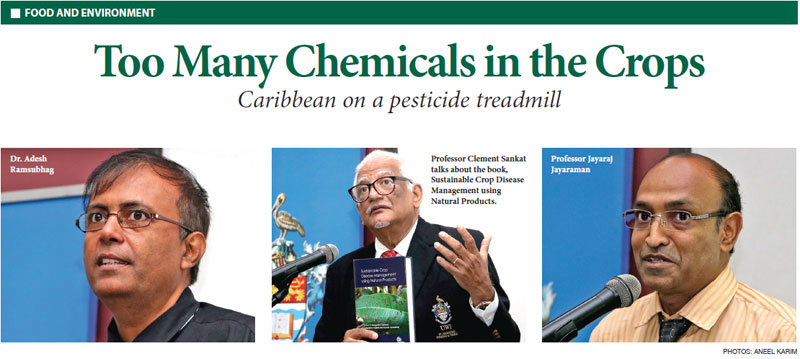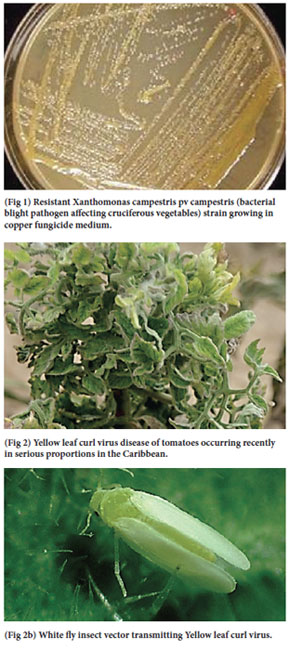 |
 |
 |
|
July 2016 |
One common practice that is contributing to poor quality of vegetables in the region is the indiscriminate use of pesticides such as insecticides, fungicides and weedicides. This results in high levels of chemical residues which also present a serious health risk to the consuming public. The problem is becoming grave in the eastern and southern Caribbean, which has been moving on a “pesticide treadmill,” relying on large quantities of pesticides for crop production. It is often speculated that the high pesticide usage might be a contributing factor for increased occurrence of cancer and other malignant disorders among the Caribbean population. The effect of pesticide residual contamination on human health is much worse in vegetables than in other food crops, because obviously vegetables are consumed either raw or semi-cooked. The region is beset with problems that affect crop protection, including the lack of awareness on integrated systems of disease management. There is also inadequate knowledge on pests and diseases that often lead to misdiagnosis and improper management practices. It is common for farmers to use incorrect chemical pesticides or too high dosages. Chemicals are often applied at greater frequencies than necessary and sometimes with incompatible mixtures are used. There is often monotonous use of pesticides with similar active ingredients which influence the development of resistance of pathogens to the chemical agents. The research group at UWI, St. Augustine led by Professor Jayaraj Jayaraman and Dr. Adesh Ramsubhag is studying the disease trends of vegetables in Trinidad and Tobago and in the Southern Caribbean and conducting research on developing field-level integrated disease management systems for vegetable crops. Extensive field surveys revealed the above mentioned pitfalls and problems. More than 50% of the farmers were using pesticides at weekly intervals and some even twice a week, while the standard recommendation is generally every two weeks, based on need only. This excessive pesticide use results in a cyclical problem, with greater incidence levels of diseases and pests often occurring, despite application of chemical pesticides. This is due to development of resistance among the pests and pathogens. To cite a few examples, the UWI group has isolated several strains of bacterial and fungal pathogens that are resistant to commonly used copper fungicides and even to other commonly used systemic fungicides (Fig 1). The excessive usage of insecticides including synthetic pyrithroids have resulted in widespread resurgence of many sucking insect pests. One such striking example is increased prevalence of whiteflies and whitefly-borne virus diseases in vegetable crops which were neither reported in Trinidad nor in the Caribbean earlier. For instance we have observed the increased prevalence of yellow leaf curl in tomato (Fig 2) all over Caribbean in recent times. This virus is spreading to other crops including cow pea (bodi) as white fly population proliferates. We observed new pathogens such as the zucchini mosaic virus that is severely affecting pumpkins and other cucurbits in Trinidad. Considering these scenarios, there are imminent risks of development of new epidemics in the Caribbean region through emergence of new pathogens and pests in the very near future. Any attempt to improve vegetable production would need to address the primary issues of management of crop pests and diseases, including reducing the indiscriminate use of pesticides by employing multiple approaches in a well-integrated and harmonious manner. This relates to the concepts of integrated pest management (IPM), integrated disease management (IDM) and integrated crop management (ICM) systems. IDM/IPM approaches are balanced, environmental sensitive and sustainable approaches that rely on a combination of common sense practices applied on a timely fashion to control the incidence of diseases and pests to levels below the tolerable limits. The approaches employed include cultural, biological, biotechnological and chemical approaches which are environmentally compatible, economically feasible and socially acceptable, and effect the least possible hazards to people, ecosystem and the environment. Prof. Jayaraman’s team is working on a research project funded by the African, Caribbean, Pacific-European Union (ACP-EU) to develop IDM systems for model vegetable crops including tomato, cowpea and pumpkin. Under this Project, protocols were optimized for early diagnosis of pathogens and diseases employing contemporary molecular based tools. Several IDM packages were developed and tested in farmers’ fields that were proven to be successful in controlling diseases of the above vegetable crops. By implementing such methods, it is expected that the amount of chemical usage can be cut down to at least 50% which effects a big saving on the cost of production and above all minimizes the risk of residual toxicity, environmental pollution and health hazards which are otherwise caused by over use of chemicals. Farmers are welcome to interact with the DLS-UWI group to gain further knowledge on IDM methods. The Department of Life Sciences, UWI-St. Augustine recently hosted an International Conference on Integrated Disease Management of Tropical Vegetables (June 16th and 17th, 2016. http://sta.uwi.edu/conferences/16/idm/index.php) which was widely attended by farmers and stakeholders from the Caribbean region. Contacts: Professor Jayaraj Jayaraman (jayauwi@gmail.com) Dr. Adesh Ramsubhag (adash.ramsubhag@gmail.com) |


 Vegetable production in the Caribbean is yet to achieve self-sufficiency, despite this region having a conducive environment for growing a variety of tropical and sub-tropical vegetable crops. The huge spending on importing food and vegetables may not be necessary if crop production systems are made more efficient. In this region, yields and quality of the harvested produce have been lower than other parts of the developing world because of the poor productivity, high incidence levels of pests and diseases, poor crop management practices and drought and erratic climatic conditions. While the latter factors are purely weather-related, they in fact contribute to the changing scenario of disease and pest status in the Caribbean.
Vegetable production in the Caribbean is yet to achieve self-sufficiency, despite this region having a conducive environment for growing a variety of tropical and sub-tropical vegetable crops. The huge spending on importing food and vegetables may not be necessary if crop production systems are made more efficient. In this region, yields and quality of the harvested produce have been lower than other parts of the developing world because of the poor productivity, high incidence levels of pests and diseases, poor crop management practices and drought and erratic climatic conditions. While the latter factors are purely weather-related, they in fact contribute to the changing scenario of disease and pest status in the Caribbean.